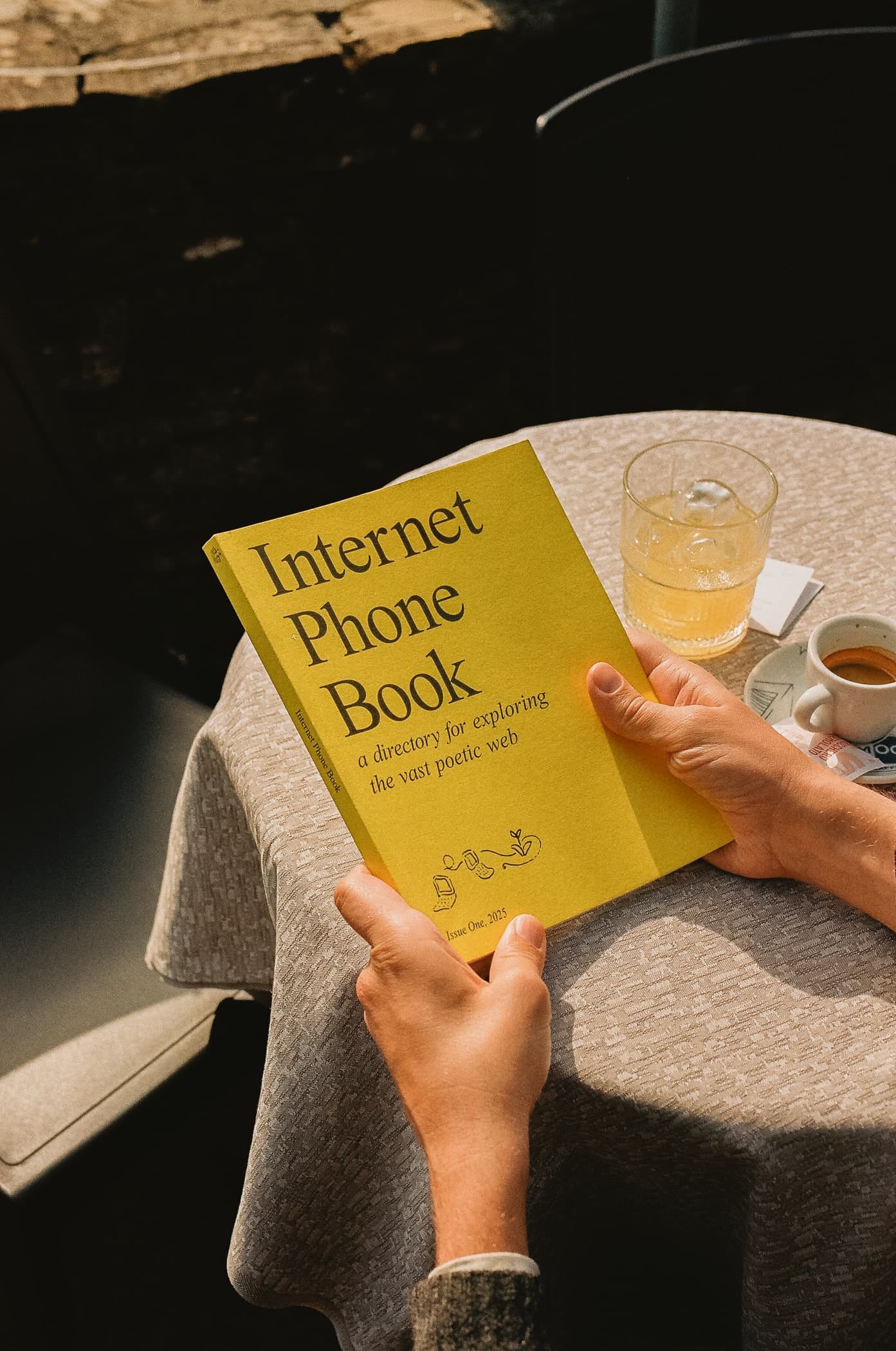Internet Phone Book
And Richard Lewei Huang on The Pastinter.net Directory

Dear reader,
The Internet Phone Book is out! (And sold-out)
It is a book about the people and websites you can meet on the Internet outside social media and dominant search engines. The first issue features essays about websites and a directory of more than 700 websites, submitted in categories such as Publishing, Ecology, and Atmosphere. Each website includes a personal message and a dial-a-site code for easy browsing. For example, if you call 585, you’ll be directed to my website.
My friend Matt (call 390) describes it as an art project. It’s sweet of him, and I know he means it as a compliment, but I don’t desire for the book to live in museums, galleries, and safety boxes. I want the book to be touched, carried in bags, browsed in bookshops, held in hands, and displayed in personal libraries.
I understand if it feels extravagant to publish a book for your friends, with your friends. But maybe that’s exactly what’s missing in the monolithic expression of the Internet: growing through the scale of human relations. For the Internet Phone Book, the submissions came from friend to friend to friend until several hundred were submitted from all over the world. As a network, this must look like a healthy ecosystem full of nodes, links, and interdependencies, almost like the web itself.
The book sold out online in 21 hours. But you might be able to find a copy at a few independent bookstores or meet us on our book tour (I’m at Adad Books on Wednesday). Otherwise, we are looking into doing a reprint, so subscribe to the mailing list if you want to know when the book is back in stock.
Finally, I want to say that I’m completely overwhelmed by the love the book has received, from the sponsors who believed in our early sketches of the idea, to everyone who bought a copy or sent kind messages. It’s magical to have a book full of your friends. Thank you.
With care,
Kristoffer
𓆝 𓆟 𓆞 𓆝 𓆟
Richard Lewei Huang: The Pastinter.net Directory
Richard Lewei Huan is a creative/critical technologist, researcher, and artist.
What is the pastinter.net directory?
It is a searchable collection of URLs featured in printed Internet guidebooks published around the world in the 1990s-early 2000s. Visitors can search for historical URLs by keyword, and visit these URLs via web archives. It is still an ongoing project - so expect many rough edges - with more URLs and features to be added in the coming year. The site is designed to be compatible with old web browsers (think IE and Netscape versions from the late 90s) running on emulation or actual old hardware.
Why did you start it?
Printed Internet guidebooks are today a largely forgotten chapter in historical accounts of information retrieval on the Internet. By building this website, I intend to allow researchers, artists, and anyone interested in the early web to (re)visit these historical URLs through web archives, and highlight the role these books played in shaping how vernacular Internet users in the 1990s imagined and used the Internet and the web (which will be part of my PhD dissertation).
Who or what inspired you?
My biggest inspiration for this project is of course the books themselves and their authors. I am also inspired by recent attempts at curating thematic web directories; the game Hypnospace Outlaw; and the various ongoing movements in reviving the creative, social, and navigational practices of the early web. I believe these books have something valuable to teach us as we start to look into alternatives to algorithms for curating and presenting online information.
Visit pastinter.net or Richard’s personal website (or call 647).
𓅰 𓅬 𓅭 𓅮 𓅯
Field Notes
1.
Paging the Poetic Web. In our first interview about the Internet Phone Book, I explained what I talk about when I talk about the »poetic web.« I also mention how exciting it is to create new ways of connecting people online outside social media, and for the book to be at the National Library of Greece.
2.
The Whole Internet is one of my favourite web talks. Olia Lialina reflects on the history of the web, borrowing the title from The Whole Internet User’s Guide and Catalog, a 1992 book about the internet, sold in 1,000,000 copies.
3.
»It would be exaggerating to suggest that phone books were experienced as utopian, but they conveyed a commonsense attitude that at some infrastructural level, by at least one setset of one set of bureaucracies, everyone was being treated the same.«
— Rob Horning in Phone Books
4.
Calls for Participation: Are.na Annual (Due 23/5), Okay Space (Due 31/5), Lullaby Machine second issue (Due 10/6), Everyoneisagirl (Due 15/6), form + foliage (Due 15/6), Error 406 (Due, 17/6), and Peckham Digital (Due 30/6).
5.
Poetic Web Calendar: Maintenance Phone Collective (Berlin, 20/5), Ringtone Workshop (London, 20/5), Rejects: An Auction for CultureHub (Hybrid, 20/5), NODE+CODE (Frankfurt, 20/5), Internet Phone Book Release Party (Athens, 21/5), connect→collide→collab (New York, 24/5), International Conference on Live Coding (Barcelona, 27-31/5), Demo Day (NYC, 4/6), Materials (London, 7/6), and Cursor Launch Party (Copenhagen, 13/6).
𖡼.𖤣𖥧𖡼.𖤣𖥧
Wayside Flowers (Phone Book Edition)
I also want to add an extra big thank you to Elliott Cost for the collaboration on the Internet Phone Book. Elliott coded the entire book in HTML and CSS and filled it with cute handdrawn illustrations. And to Uno and Ana for always supporting me and for living the life we do.
Last email was sent to 4628 inboxes. Eight people support me taking time putting this email together with paid subscriptions (thanks for the upgrade, Thom, a postcard is coming soon). You can send questions, comments, products, sites, links, and more to kristoffer@naiveweekly.com.



